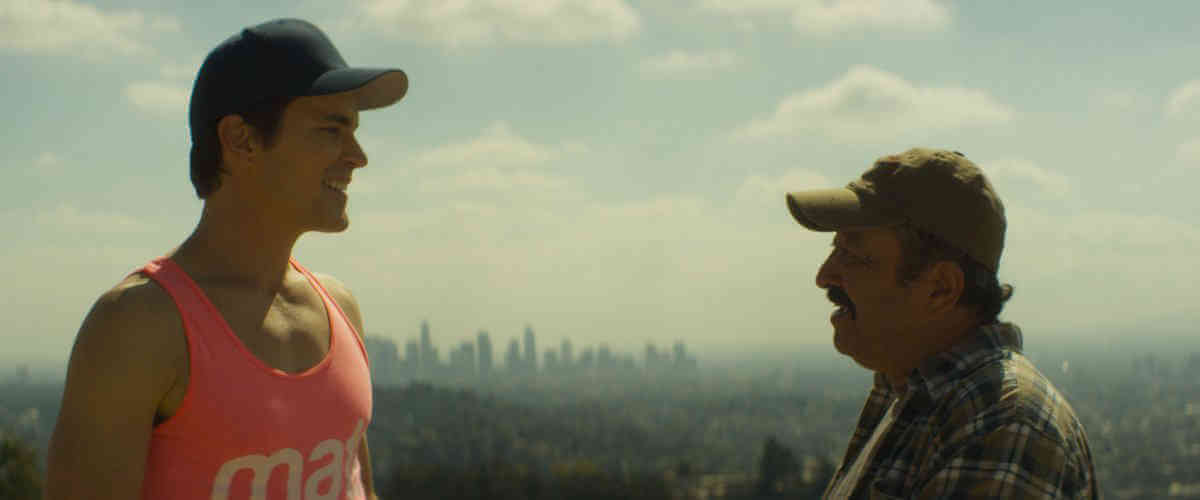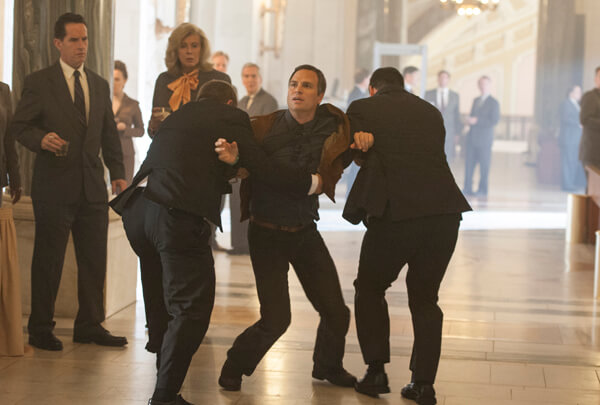“Papi Chulo,” the affable new comedy-drama by out gay writer/ director John Butler, chronicles the charming, tender bromance that develops between Sean (Matt Bomer), a gay weatherman in Los Angeles, and Ernesto (Alejandro Patiño), a married-with-kids day laborer he hires to paint his deck. Their friendship develops because Sean is lonely. He pays Ernesto for his companionship. However, over time, each man sees a way of helping the other; they are able to give the other man something he wants — even though it is not necessarily something they would want for themselves.
In a recent Skype interview, the Irish Butler said he came up with the idea from his observations driving around Los Angeles and his outsider perspective.
“I was looking at the relationship between the working class Latino community in Los Angeles and the middle class gay community in West Hollywood,” he explained. “It’s under-explored, and I’m interested in stories with a gay everyman and, in this instance. with a Latino everyman, and how they might interact.”
As a buddy movie, “Papi Chulo” does not play up the gay or Latino migrant angle. Butler deliberately does not make the story about the gay character’s anxieties about sexuality or the misery of the migrant experience in America.
“It’s hard to make an apolitical film in 2019,” Butler said.
He succeeds brilliantly, however, in having written and directed a film where absolutely nothing is made whatsoever about Sean’s sexuality. It is not an issue in his workplace, for Ernesto, or for anyone the men encounter. Sean is not defined by his sexuality, nor does it negatively impact how he is perceived by others, which is refreshing.
What “Papi Chulo” does show is how the emotionally adrift Sean copes with his loneliness (or, rather doesn’t) after his last relationship ends.
“The media tells us you can get whatever you want, but there is no app for [curing] loneliness,” Butler observed. “You enter into transactional relationship with your own parameters and hopes. I like the idea of a potential hookup that goes off the rails. I’ve experienced great kindness and friendships on apps. That’s lovely to think about, but it was interesting to push this idea in a different way.”
Sean is a gay man who simply wants what everyone wants — love and happiness. He projects that onto Ernesto as the characters bond in going boating on a lake and hiking in the mountains, and Sean talks about his feelings. That Ernesto knows little English makes him a good listener. But the guys do sing along to Madonna’s “Borderland” in the back of a Lyft after attending a party together.
“Ernesto brings the music into Sean’s life, and he lightens the scene,” Butler said about one positive impact the Latino man has on him.
Elaborating on the dynamic between his characters, the filmmaker added, “I like the idea of two lonely people connecting in a city. I was reading think pieces about an epidemic of gay loneliness. This strain of loneliness pertains to members of the gay community who have not built a family biologically or logically — to borrow Armistead Maupin’s term — and a man who has built a family who is happier than a guy who has it all. Who are these humans, and how do they interact?”
Butler lets viewers find out by letting his film unfold at its own pace and allowing the comedy and drama to gently interact.
“It’s told in a measured way,” he explained. “All my films are on that scale. It’s a replication of the human experience. Life is absurd and serious and hilariously funny.”
“Papi Chulo” plays with the rules of the buddy film subgenre, adhering to some elements, but subverting others. This is Butler’s strength in his approach, and why his films (which also include “Handsome Devil,” and “The Bachelor Weekend”) are so disarming. He includes signposts, such as cleansing rain — Sean is a weatherman, after all — to deliver an emotional payoff. But he also features only a few scenes of Ernesto alone to underscore that is story is about the impact the two men have on each other. The absence of Ernesto from parts of the story (because Sean’s point of view is the focus) makes viewers want to see more of the Latino man. Such is the magic of Butler’s film (and Patiño’s performance). Bomer is also extraordinary in the film, playing Sean in a way that captures his self-pity and humility but also his humanity. The director applauded Bomer’s commitment, intelligence, and courage in playing the role.
As for finding his own personal happiness (outside of making films), Butler said, “I’m a work in progress. I’m not in a position to offer anything that sounds close to wisdom on that. It’s the job of a lifetime for all of us. But I’d never underestimate the value of friendship for making you happy.”
PAPI CHULO | Directed by John Butler | Blue Fox Entertainment | Opens Jun. 7 | Village East Cinema, 189 Second Ave. at E. 12th St.; citycinemas.com/villageeast































